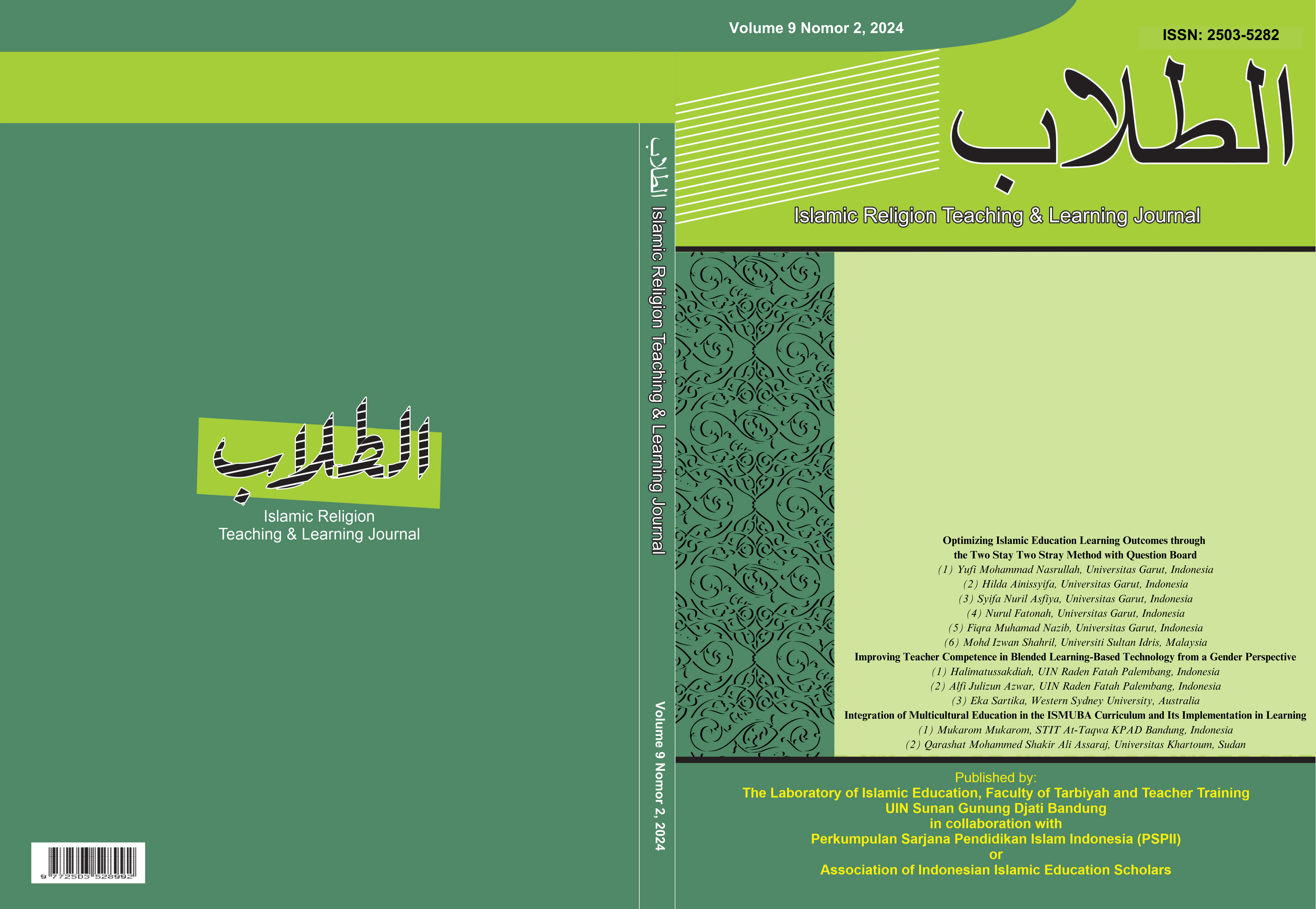Green School and Its Implementation in Islamic Educational Institutions in Indonesia
DOI:
https://doi.org/10.15575/ath.v9i2.30171Keywords:
Adiwiyata, Education institution, Green schoolAbstract
Climate change regarding global warming threatens human life on earth, so there needs to be solutions from various parties to reduce the negative effects of climate change. Implementing these principles in Islamic educational institutions in Indonesia still needs to improve understanding, policies, and implementation in the field. Therefore, this study aims to analyse the implementation of Green Schools in Islamic educational institutions in Indonesia, identifying factors that support and hinder its implementation. The research method used is a case study with a qualitative approach—data collection techniques using document analysis from research results published in national and international journals. Data analysis is done through data condensation, data display, and verification. The green school program is a program that must be implemented in educational institutions. Green schools and green buildings can improve teacher performance and academic achievement. Various Islamic educational institutions have carried out green school programs; some have received Adiwiyata awards from the Indonesian Government. However, Islamic education institutions still need to implement green schools properly. Islamic educational institutions should consistently implement green school programs in their respective institutions to reduce climate change's negative effects. Perubahan iklim dan pemanasan global mengancam kehidupan manusia, sehingga diperlukan solusi dari berbagai pihak untuk mengurangi dampak negatifnya. Salah satu solusi adalah program green school di lembaga pendidikan, termasuk di lembaga pendidikan Islam di Indonesia. Namun, implementasi program ini masih menghadapi tantangan, terutama terkait pemahaman, kebijakan, dan pelaksanaan di lapangan. Penelitian ini bertujuan untuk menganalisis implementasi green school di lembaga pendidikan Islam, serta mengidentifikasi faktor pendukung dan penghambatnya. Metode yang digunakan adalah studi kasus kualitatif dengan teknik analisis dokumen dari jurnal nasional dan internasional. Program green school memiliki manfaat, seperti meningkatkan kinerja guru dan prestasi akademik siswa. Walau beberapa lembaga telah meraih penghargaan Adiwiyata, konsistensi penerapan di lembaga pendidikan Islam perlu ditingkatkan untuk mengurangi dampak perubahan iklim.References
Al Mawangir, F. H. M., & Puspita, F. (2020). Pola Pembentukan Karakter Peduli Lingkungan melalui Program Adiwiyata di MTsN 6 Sleman. Tarbiyah Wa Ta’lim: Jurnal Penelitian Pendidikan Dan Pembelajaran, 7(2), 108–117. https://doi.org/https://doi.org/10.21093/twt.v7i2.2443
Azkiah, H. (2021). Pendidikan Agama Islam Berwawasan Lingkungan (Ecopedagogy) di Madrasah Ibtidaiyah. BINTANG, 3(3), 387–397.
Bell, A. C., & Dyment, J. E. (2008). Grounds for health: the intersection of green school grounds and healthâ€promoting schools. Environmental Education Research, 14(1), 77–90. https://doi.org/10.1080/13504620701843426
Biagini, B., & Miller, A. (2013). Engaging the private sector in adaptation to climate change in developing countries: importance, status, and challenges. Climate and Development, 5(3), 242–252. https://doi.org/10.1080/17565529.2013.821053
Bowen, G. A. (2009). Document analysis as a qualitative research method. Qualitative Research Journal, 9(2), 27–40. https://doi.org/10.3316/QRJ0902027
Browning, M. H. E. M., & Rigolon, A. (2019). School Green Space and Its Impact on Academic Performance: A Systematic Literature Review. International Journal of Environmental Research and Public Health, 16(3), 429. https://doi.org/10.3390/ijerph16030429
Çakır, S., & Tuna Taygun, G. (2021). The Re-Evaluation of Existing School Buildings in Turkey within the Context of ‘Green School.’ ICONARP International Journal of Architecture and Planning. https://doi.org/10.15320/ICONARP.2021.156
Carman, J., Zint, M., Burkett, E., & Ibáñez, I. (2021). The role of interest in climate change instruction. Science Education, 105(2), 309–352. https://doi.org/10.1002/sce.21610
Caro, D. H., Cortina, K. S., & Eccles, J. S. (2015). Socioeconomic background, education, and labor force outcomes: Evidence from a regional US sample. British Journal of Sociology of Education, 36(6), 934–957. https://doi.org/10.1080/01425692.2013.868784
Dupuis, J., & Durham, R. E. (2024). K-12 science achievement: time-varying influence of Green School initiatives. Environmental Education Research, 30(2), 306–319. https://doi.org/10.1080/13504622.2023.2253502
Earthman, G. I. (2009). Planning Educational Facilities: What Educators Need to Know. R&L Education.
Edwards, B. W. (2006). Environmental Design and Educational Performance: With Particular Reference To ‘Green’schools In Hampshire And Essex. Research in Education, 76(1), 14–32. https://doi.org/https://doi.org/10.7227%2FRIE.76.2
Farrow, K., Grolleau, G., & Ibanez, L. (2017). Social norms and pro-environmental behavior: A review of the evidence. Ecological Economics, 140, 1–13. https://doi.org/https://doi.org/10.1016/j.ecolecon.2017.04.017
Fathurrahman, F., Kumasalari, D., Susanto, H., Nurholipah, N., & Saliman, S. (2022). Implementasi Pembentukan Karakter Peduli Lingkungan melalui Program Adiwiyata. Jurnal Pendidikan Dan Konseling: Special Issue (General), 4(6), 13038–13044. https://doi.org/https://doi.org/10.31004/jpdk.v4i6.10660
Figueiro, M. G., & Rea, M. S. (2010). Lack Of Short-Wavelength Light During The School Day Delays Dim Light Melatonin Onset (Dlmo) In Middle School Students. Neuro Endocrinology Letters, 31(1), 92.
Hafidhoh, N. (2015). Implementasi Pelaksanaan Program Green School Di Smp Negeri 1 Kudus. Edu Geography, 3(6).
Heschong, L., & Mahone, D. (2003). Daylighting in Schools: Reanalysis Report. In California: California energy Commission.
Hogarth, S., Bennett, J., Campbell, B., Lubben, F., & Robinson, A. (2005). A systematic review of the use of small-group discussions in science teaching with students aged 11–18, and the effect of different stimuli (print materials, practical work, ICT, video/film) on students’ understanding of evidence. Research Evidence in Education Library.
Ichsan, I. Z., Pertiwi, S., & Hermawan, Y. (2023). Previous research related to the empowerment of elementary school teachers’ knowledge in supporting green schools shows the importance of increasing environmental competence for teachers as a determining factor in the success of environmentally friendly s. Journal of Community Service and Empowerment, 4(1), 139–144. https://doi.org/https://doi.org/10.22219/jcse.v4i1.24522
Jamora Nasution, A. G. (2018). Pendidikan Anak Berwawasan Lingkungan Persfektif Islam. Ihya Al-Arabiyah, 4(1), 33–45. https://doi.org/10.30821/ihya.v4i1.1811
Kagawa, F. (2007). Dissonance in students’ perceptions of sustainable development and sustainability: Implications for curriculum change. International Journal of Sustainability in Higher Education, 8(3), 317–338. https://doi.org/https://doi.org/10.1108/14676370710817174
Kospa, H. S. D. (2021). Kajian Pendidikan Lingkungan Hidup di Indonesia. Jurnal Tekno Global, 10(1). https://doi.org/https://doi.org/10.36982/jtg.v10i1.1722
Kuswati, R., Choirunnisa, B. A., Ahmadi, M. A., Abbas, N. I., Waskito, J., Achmad, N., Soepatini, S., & Irawati, Z. (2024). Institutional Enhancement through Green School Program in Order to Achieving “Sekolah Adiwiyata.†British Journal of Environmental Studies, 4(1), 41–47.
Mason, L., Manzione, L., Ronconi, A., & Pazzaglia, F. (2022). Lessons in a Green School Environment and in the Classroom: Effects on Students’ Cognitive Functioning and Affect. International Journal of Environmental Research and Public Health, 19(24). https://doi.org/10.3390/ijerph192416823
McMillan, J., & Schumacher, S. (2014). Research in Education: Evidence-Based Inquiry (Seventh Ed). Pearson Education Limited.
Miles, M. B., Huberman, Michael, A., & Saldaña, J. (2014). Qualitative Data Analysis: A Methods Sourcebook (Third edit). SAGE Publications Inc.
Mustangin, M. (2017). Perubahan iklim dan aksi menghadapi dampaknya: Ditinjau dari peran serta perempuan Desa Pagerwangi. Jurnal Pendidikan Dan Pemberdayaan Masyarakat, 4(1), 80–89. https://doi.org/https://doi.org/10.21831/jppm.v4i1.13051
Muzadi, A., & Mutholingah, S. (2019). Integrasi Pendidikan Berwawasan Lingkungan Hidup (Green School) Melalui Pembelajaran PAI di Sekolah. Talimuna: Jurnal Pendidikan Islam, 8(2), 53–71. https://doi.org/10.32478/talimuna.v8i2.292
Nasir, M. (2009). Pengembangan Kurikulum Berbasis Madrasah. HUNAFA: Jurnal Studia Islamika, 6(3), 273–300. https://doi.org/https://doi.org/10.24239/jsi.v6i3.138.273-300
Nuraeni, A. (2022). Implementasi Program Adiwiyata dalam Membangun Karakter Peduli Lingkungan di Sekolah Dasar Negeri 008 Palaran.
Nurwidodo, N., Al Muhdhar, M. H. I., Rohman, F., Iriani, D., Herlina, H., & Fausan, M. M. (2019). Building pro-environmental behavior among school community of Adiwiyata green school. JPBI (Jurnal Pendidikan Biologi Indonesia), 5(1), 23–32.
Nurzaelani, M. M. (2017). Peran guru dalam pendidikan lingkungan hidup. Jurnal Teknologi Pendidikan, 6(1). https://doi.org/10.32832/tek.pend.v6i1.503
Nuzulia, S., Sukamto, S., & Purnomo, A. (2019). Implementasi program adiwiyata mandiri dalam menanamkan karakter peduli lingkungan. SOSIO DIDAKTIKA: Social Science Education Journal, 6(2), 155–164.
Oetinger, J. W. (2010). Green Schools: Constructing and Renovating School Facilities with the Concept of Sustainability. Lindenwood University.
Oknasari, V. E., Kurniawati, K., & Utha, M. A. (2023). Evaluation of Green School Implementation in the South Tangerang Region at SMP 9 and SMP Islam Amalina. Budapest International Research and Critics Institute-Journal (BIRCI-Journal), 6(3), 1671–1681.
Pujianto, W. E., Larassaty, A. L., Novie, M., Muzdalifah, L., & Rosyidah, E. (2021). Eco-Pesantren: Islamic boarding school transformation program to support natural sustainability and sustainable development. Proceedings of the International Conference on Industrial & Mechanical Engineering and Operations Management, 2(1), 873–885.
Rahmah, U. (2017). Pengaruh Penerapan Green School Terhadap Minat Belajar Siswa di SMPN 26 Surabaya. AT-TURAS: Jurnal Studi Keislaman, 4(2), 153–171.
Ramli, N. H., Masri, M. H., Zafrullah, M., Taib, H. M., & Abd Hamid, N. (2012). A comparative study of green school guidelines. Procedia-Social and Behavioral Sciences, 50, 462–471.
Rokhmah, U. N. (2019). Pelaksanaan Program Adiwiyata Sebagai Upaya Pembentukan Karakter Peduli Lingkungan Siswa Di Madrasah Ibtidaiyah. Al Qalam: Jurnal Ilmiah Keagamaan Dan Kemasyarakatan, 13(1), 67–88. https://doi.org/10.35931/aq.v0i0.133
Salsabila, S. J. (2021). Implementasi Program Green School terhadap Sikap Peduli Lingkungan. JPMP (Jurnal Pendidikan MIPA Pancasakti), 5(2), 82–90.
Strife, S. (2010). Reflecting on environmental education: Where is our place in the green movement? The Journal of Environmental Education, 41(3), 179–191.
Sukmadinata, N. S. (2011). Metode Penelitian Pendidikan. Remaja Rosda Karya.
Taylor, Z., Jacobs, G., Roth, D., & Wiedower, J. (2013). Green School Investment Guide: for Healthy, Efficient and Inspiring Learning Spaces. The Center for Green Schools at USGBC, 3–4.
Wardani, D. N. K. (2020). Analisis Implementasi Program Adiwiyata dalam Membangun Karakter Peduli Lingkungan. Southeast Asian Journal of Islamic Education Management, 1(1), 60–73. https://doi.org/https://doi.org/10.21154/sajiem.v1i1.6
Wardani, R. (2023). Implementasi Program Adiwiyata dalam Membangun Karakter Peduli Lingkungan SD. Attadib: Journal of Elementary Education, 7(3). https://doi.org/https://doi.org/10.32507/attadib.v7i3.2036
Warju, S. P. H., & Soenarto, M. D. H. (2017). Evaluating the implementation of green school (Adiwiyata) program: Evidence from Indonesia. International Journal of Environmental and Science Education, 12(6), 1483–1501.
Widiyaningrum, P., Lisdiana, L., & Purwantoyo, E. (2016). Evaluasi partisipasi siswa dalam pengelolaan sampah untuk mendukung program sekolah Adiwiyata. Indonesian Journal of Conservation, 4(1). https://doi.org/10.15294/ijc.v4i1.5161
Downloads
Published
How to Cite
Issue
Section
License
Authors who publish with this journal agree to the following terms:
- Authors retain copyright and grant the journal right of first publication with the work simultaneously licensed under a Creative Commons Attribution-ShareAlike License that allows others to share the work with an acknowledgement of the work's authorship and initial publication in this journal.
- Authors are able to enter into separate, additional contractual arrangements for the non-exclusive distribution of the journal's published version of the work (e.g., post it to an institutional repository or publish it in a book), with an acknowledgement of its initial publication in this journal.
- Authors are permitted and encouraged to post their work online (e.g., in institutional repositories or on their website) prior to and during the submission process, as it can lead to productive exchanges, as well as earlier and greater citation of published work (See The Effect of Open Access).






